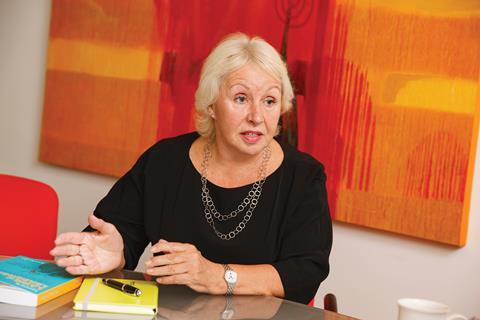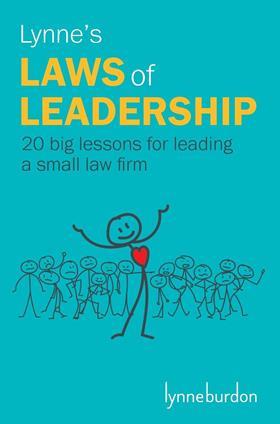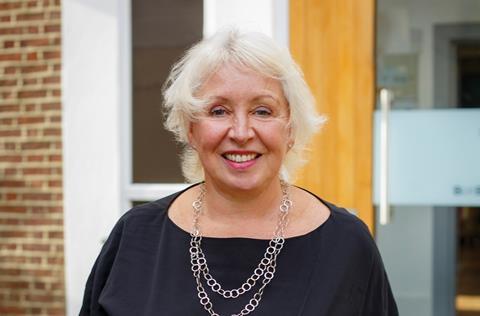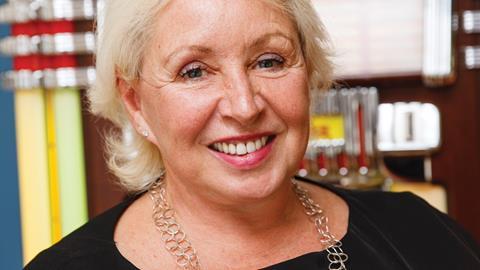Three decades as a managing partner crystallised Lynne Burdon’s ‘core ideology’, the entrepreneur, mentor and author tells Jonathan Rayner
Biog
BORN
Stockton-on-Tees
EDUCATION
Mathematics, University College London
LLB, College of Law
MBA, Nottingham Trent University
ROLES
Solicitor, Osmond Gaunt & Rose, London
Founder, managing partner, Bolt Burdon and Bolt Burdon Kemp
KNOWN FOR
Three decades as managing partner in firms she established – taking them from a five-person start-up to a headcount of 170.
Author of Lynne’s Laws of Leadership: 20 Big Lessons for Leading a Small Law Firm
Envision this. In your reception area there are two sombre-suited types with briefcases and polished shoes. They are waiting to see a company commercial partner. A dishevelled man enters and sits close to them. He wants representation to defend a charge of indecent exposure. You are all for diversity and inclusion, of course, but you’re also uncomfortably aware that this really is not the client mix that shows your firm in its best light. What should you do about it?
Imagine another law firm dilemma, this one involving members of your team. Do you have any ‘parked ones’ or ‘gentle underminers’ sitting at their desks and compromising the integrity of the firm? How are you going to deal with them without stoking insecurity among your best performers?
Dilemmas, indeed, but Lynne Burdon has been a managing partner for 30 years and, in that time, has come across and resolved every problem that you can conceive of and probably more besides. She has crystallised this accumulated wisdom into a book, published in October 2018, titled Lynne’s Laws of Leadership. But we race ahead.
Starting up
In 1986, Burdon and fellow partner Roger Bolt left one London firm to set up another, Bolt Burdon. The new firm initially comprised five people: themselves, two secretaries and a trainee.
‘We’d been given the chance of a lifetime,’ Burdon recalls. ‘We were both partners at the previous firm and had ambitions to improve it. We were hungry and we wanted more – more challenge, more fun and more money – but the other partners weren’t interested. And starting a firm of our own from scratch without any clients just didn’t seem possible. We couldn’t take any of our existing clients because of covenants in our partnership deeds.’
We were young and naive. I was just 30 at the time. We had a lot to learn about running a business, but we were determined to learn and succeed
It was a partnership dispute that broke the deadlock. ‘Roger and I managed to agree to leave on terms that would allow us to take all our current work and clients with us,’ she says. ‘This was our opportunity to create the firm of our dreams.’
Burdon confesses: ‘It’s fortunate that we didn’t know just how much we didn’t know – because if we had, I’m not sure we would have had the courage to go ahead. We were young and naive. I was just 30 at the time. We had a lot to learn about running a business, but we were determined to learn and succeed.’
Clearly, they learned some very valuable lessons. Bolt Burdon and its sister firm Bolt Burdon Kemp, created in 2003 and which specialises in claims for abuse and catastrophic injury, grew from five people in 1986 to just shy of 200 solicitors, paralegals, trainees and administration staff before settling down to its 2018 headcount of around 170. In a stroke of serendipity, the week of the Gazette interview saw Bolt Burdon Kemp ranked in the Legal 500 as top tier for clinical negligence and second tier for personal injury (PI).
A key lesson Burdon says she learned is the need for a firm’s founder to have a ‘core ideology’. That is to say, ‘being utterly clear about why your business exists and why you bother to get up every morning to go and work at it. It’s a combination of core purpose and core values. In our case, the “why” is about outstanding lawyers providing expert legal advice in conjunction with amazing client service’.

LESSONS ON HIRING
‘We wish we could be better at recruiting,’ Lynne Burdon confesses. ‘If a candidate genuinely shares our values, then almost everything else can be trained. The problem is that some people visit our website, learn what our values are and are then able to say all the right things at interview. Once they have been appointed, however, it becomes apparent, not that they are bad lawyers, but that they don’t, after all, subscribe wholeheartedly to our values. The problem isn’t confined to us. Most firms acknowledge how difficult it is to recruit the right person.
‘One of several valuable lessons that we have learned about recruitment over the years is blindingly obvious. That is, you need to recruit someone who is better than you are if the firm is going to improve. It can be difficult for some team leaders to recruit someone who is going to leapfrog over them, but it must be done. That’s why it’s best to get your top people, such as equity partners, involved in the recruitment.
Burdon contends that it is ‘critical’ that all business leaders are totally clear as to why their businesses exist. If they are not totally clear, she says, they will face problems because they will lack direction, not know what to do next and struggle to communicate – to staff and to clients - what is of paramount importance to the business.
It’s a waste of a life if you don’t enjoy your work. Work is what gives your life meaning. It is important to love it
How staff are appreciated builds on that. ‘Our previous firm didn’t value us,’ she replies. ‘It was simply expected of us that we would work long hours. Every Christmas we would struggle to get a budget for a staff party. We, on the other hand, want our Bolt Burdon people not only to share our core ideology, but also to enjoy their work. It’s a waste of a life if you don’t enjoy your work. Work is what gives your life meaning. It is important to love it.’
Has Burdon succeeded in making the two firms great places to work? She responds that she and Bolt set out to provide an environment where people feel happy and free, and have meaningful and challenging jobs.
‘That’s when people perform at their best,’ she says. The firms have had a flexible working policy since as long ago as 2003, which is much longer than most firms and other business sectors. ‘If you employ the right people,’ she comments, ‘you can trust them.’
The firms also pay particular attention to how work is allocated because, ambitious to progress, lawyers learn best through taking on demanding cases. The firms provide legal and management training, too, and opportunities for fun both in and out of the office.
‘Spending fun time together and getting to know one another builds trust,’ she says.
New directions
Burdon stood down as managing partner of Bolt Burdon in 2016 and of Bolt Burdon Kemp last year. Why the change of direction and how is she spending her time now?
‘Succession planning,’ she replies. ‘I’d been managing partner for over 30 years, which is enough for anyone, and have now put in place a seven-year succession project. Louise Dawson has taken over as the managing partner of Bolt Burdon and Jonathan Wheeler at Bolt Burdon Kemp [both promotions were internal].’
Letting go was not easy for Burdon. ‘It was like digging my own grave or handing over my baby to someone else,’ replies Burdon. ‘But the succession is working out really, really well. It’s freed up my time to give executive coaching, mostly on team-building and leadership, but I also offer a 10-day mini-MBA. And then, of course, I have published my book.’
Lynne’s Laws of Leadership is a distillation of all that she has learned during her 30-year term as managing partner of her own law firms. Unsurprisingly, it has not all been plain sailing. One major challenge was the 2004 publication of the government-commissioned Clementi Report. This opened the door to what came to be dubbed ‘Tesco Law’, where law firms could – for the first time – be owned by non-lawyers, such as supermarkets.
‘This was a significant threat,’ Burdon remembers. ‘We knew we wouldn’t be able to compete with, for example, Tesco on price and so we decided a radical change of focus was necessary. We decided to compete on service instead.
‘Our prices and service levels went up, but the strategy worked. It was a big decision, but the change in focus was one we felt was essential for the survival of the firm.’
In the end, of course, Tesco never did branch out into legal services, and the term ‘Tesco Law’ became something of a misnomer. But the experience led Burdon to title her second rule of leadership: ‘The more you focus, the better you will do.’
It was that second rule that solved the conundrum that started this article: what to do about business people and an alleged criminal sharing the same reception area. In 1989, three years after Bolt Burdon was founded, Burdon decided that the firm would stop providing a criminal defence service.
‘It was one of many strategic decisions that resulted in a narrower focus on the sort of work we do or the types of client we serve,’ Burdon comments. ‘We found a good local firm to refer any future criminal clients to. Criminal work is mostly about facts and evidence, whereas we were passionate about using the law. We were able to focus more on what we were passionate about.’
We’ve decided there is space in our organisation for those who share our values and do good work, but are unambitious
The book is made up of 20 rules or lessons and there is no room to describe them all in detail. However, rule eight, ‘Free up their future!’, suggests a solution to the other law firm dilemma with which this article began. It largely deals with, to put it bluntly, sacking dishonest or underachieving colleagues and helping those who are well-meaning to perform better.
‘Parked ones’ are lawyers who lack the ambition to move upwards, but nonetheless do a good job and serve clients well.
‘They are still a good car, but going nowhere,’ says Burdon. ‘We’ve decided there is space in our organisation for those who share our values and do good work, but are unambitious and not seeking to move up – who wish to remain “parked”.’ She adds that promoting such people is counterproductive. ‘They go from performing well in a job they’re happy with to underperforming in a job they never really wanted to do.’

‘Gentle underminers’, on the other hand, are often very good at their job and command fierce loyalty from their managers. But they also love to ‘stir and gossip’ and put a pejorative spin on nearly everything that happens within the firm. ‘They can do untold damage to the organisation in a hundred tiny little ways,’ says Burdon. ‘They must go.’
Good relationships are all-important to the success of a firm, maintains Burdon. Or, as she somewhat controversially puts it in the title of rule 12, ‘Choose your partners more carefully than your spouse!’ That could make for an interesting conversation over breakfast, but the commitment required from an equity partner is almost as solemn as wedding vows.
A partnership dispute is even messier than a divorce – ‘I know: I’ve done both!’
If only because of its provocative title, we cannot ignore rule 18: ‘When the shit hits the fan, buy champagne!’ This lesson concerns the biggest existential crisis to confront Bolt Burdon in its 32-year history.
On 31 March 2000 legal aid ceased for most PI cases. At that time, around half the firm’s work was PI and all of it was funded by legal aid. Disaster beckoned. There followed a stressful period of frequent audiences with the bank manager and VAT collectors. The firm’s overdraft limit rose to £1.6m. The bank urged paring overheads to the bone, including letting some staff go. But Burdon chose a contrary route.
‘I knew that the most important key to success was to maintain staff morale,’ she recalls. ‘If there was anything that was guaranteed to damage that, it was a reduction in all the things that make us a great place to work. I absolutely refused to cut expenses relating to staff – we would (continue to) give pay rises, we would not cut our training budget and we would maintain our staff welfare programme.’
Throughout this period, no attempt was made to hoodwink staff into thinking all was right with the world. Burdon told them there were huge problems, but crucially she was able to convince them that the crisis was being handled competently and a solution was at hand. The business plan was assiduously followed. Staff morale was maintained. Eventually, more than two years later, the firm turned the corner.
Where does champagne come into this? ‘Every year we have a Christmas party for staff and professional advisers,’ replies Burdon. ‘But was it appropriate to have one in December 2000? Should we cancel it or serve cheaper fizz? No. We put on our bravest party face and served champagne as usual. We gave the world the clearest message that Bolt Burdon was alive and well.’

Work means life
As a country, Burdon concludes, we should be doing more to prepare people for the world of work. She has noticed that new apprentices that the firm has employed lack the skills needed to begin their careers.
‘Often they haven’t been taught what is important, such as coming into work on time or simply turning up as arranged,’ Burdon recalls. ‘They lack communication skills. And one of them confided that he is the only person in his entire family who has a job to get up for.
‘The government, schools and employers should be giving more guidance.’
Lynne’s Laws of Leadership by Lynne Burdon is published by Practical Inspiration
































No comments yet